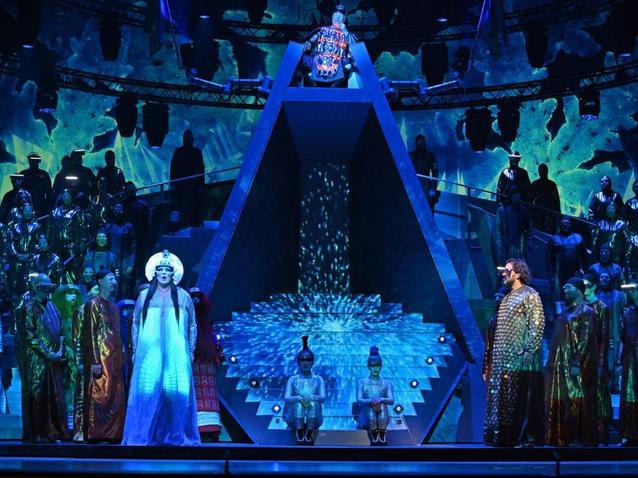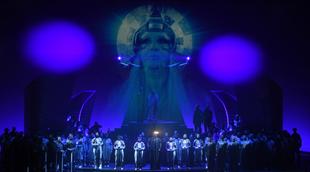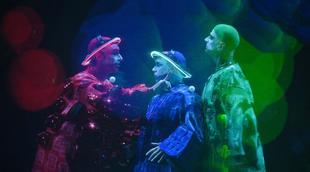 © A. Bofill
© A. Bofill
Turandot was the opera that would have been going on stage when the theatre was destroyed in a fire in January 1994. Embodying a spirit of continuity, Turandot was chosen to inaugurate the new theatre rebuilt in 1999. Now, on the 20th anniversary of Liceu’s re-inauguration, Puccini’s last opera was again the title selected to open the new season. Turandot, an opera which historically did not have any particularly significant relationship with the theatre has become, due to the force of the circumstances, a kind of symbol of the theatre reborn.
Performing the role of Turandot, one of the toughest in the repertoire, Liceu entrusted Iréne Theorin, a top level soprano highly admired at Liceu for her Wagnerian performances. Theorin did not disappoint in the character of the “princess of ice”. With an impressive force, she cut through the orchestral wall of sound, placed the high notes without difficulty and managed to find lyrical and sweet accents for the final scene. Jorge de León was a good Calaf too, confident at all times with a solid central register and brave in the attack of the notes in the upper register.
Ermonela Jaho might not have a very powerful vocal centre but Liù, the antithesis of Turandot, is all sweetness. Puccini expresses this by requesting pianissimi on high B flats from the singer in this role. Ermonela Jaho delivered them all with a seductive filato sound. This and the intense acting – she looked like the only character with blood flowing through her veins – caused her to take home the biggest applause on the opening night.
Timur was well delivered by Alexander Vinogradov and emperor Altoum, a character often chosen by great singers towards the final phase of their career, was performed with dignity but without brilliance by veteran Chris Merritt. Ping, Pang and Pong, the ministers reminiscent of the Commedia dell’Arte, reduced here to the caricature and performed by Toni Marsol, Francisco Vas and Mikeldi Atxalandabaso, started unfocused and improved when they managed to come together.
The choir, so important in Turandot, also had togetherness issues, particularly at the beginning. The complexity of the production did not favour the choir either. The orchestra was conducted by Josep Pons, who insisted through the work on the orchestral colour in highlighting the modernity of the piece’s score, where Puccini seems to open himself to the new avant-gardist currents that stirred up music in his time. The musical result, if not excellent was at least optimal.
Less optimal was the scenic result. The new production presented by Liceu proposes a Chinese close and dystopic future where the population, permanently dependent on technological gadgets, live in a virtual reality universe. They are subdued and alienated by the princess Turandot, who seems to irradiate the images feeding the virtual reality world from her led lighted tiara. In principle, there is no issue with this – theatre is in itself a virtual reality and opera makes it even more virtual by adding the music. There should be no objection to adding a third virtuality. The problems though start when we realise that theatre works with characters, not images: there can be theatre without scenography, but not without characters. Here is where this Turandot starts sinking.
The new production was signed by stage director Franc Aleu, the artist who for many years delivered the video for the productions by La Fura del Baus. Aleu is a man who works with images but not with characters, he is not a stage director. From here emerges the empty and meaningless spectacularity of this production. It suffocates in its own overcrowded images, video projections, led lightings and various toys, such as the unfortunate light swords, coming directly from Star Wars’ leftovers warehouse. From here emerges also the boring static stage that dominates the production and which is not resolved by the flamboyant Daft Punk costumes by Chu Uroz.
Video projection and multimedia technologies are highly powerful tools at the service of dramaturgy. When the tool turns from being a medium to becoming an end in itself is when things stop working. One must be careful with scenic toys.
It is also surprising in this production the naivety of the stage direction in suggesting an ending where Calaf remains captivated by the ‘virtual’ Turandot, represented by her lit up tiara, whilst a supposedly ‘authentic’ Turandot discovers thanks to the deceased Liù – and thanks her by kissing her lips – the greatness of the mystery of love. This tribute of political correctness in the “me too” era, with Turandot preferring Liù to Calaf, is however absolutely irrelevant theatrically. If Turandot continues to work almost a century later after its premiere is, like Otello, thanks to its musical and dramatic force, not to its moral excellence.
Xavier Pujol
Barcelona, 7th October 2019
Turandot by Giacomo Puccini. Iréne Theorin, soprano. Jorge de León, tenor. Ermonela Jaho, soprano. Alexander Vinogradov, bass. Chris Merritt, tenor. Toni Marsol, baritone. Francisco Vas, tenor. Mikeldi Atxalandabaso, tenor. Orchestra of Gran Teatre del Liceu. Choir of Gran Teatre del Liceu. Josep Pons, conductor. Franc Aleu, stage director. Susana Gómez, stage co-director, Chu Uroz, costumes. Production by Gran Teatre del Liceu.
the 10 of October, 2019 | Print


Comments